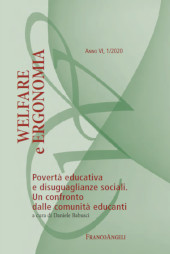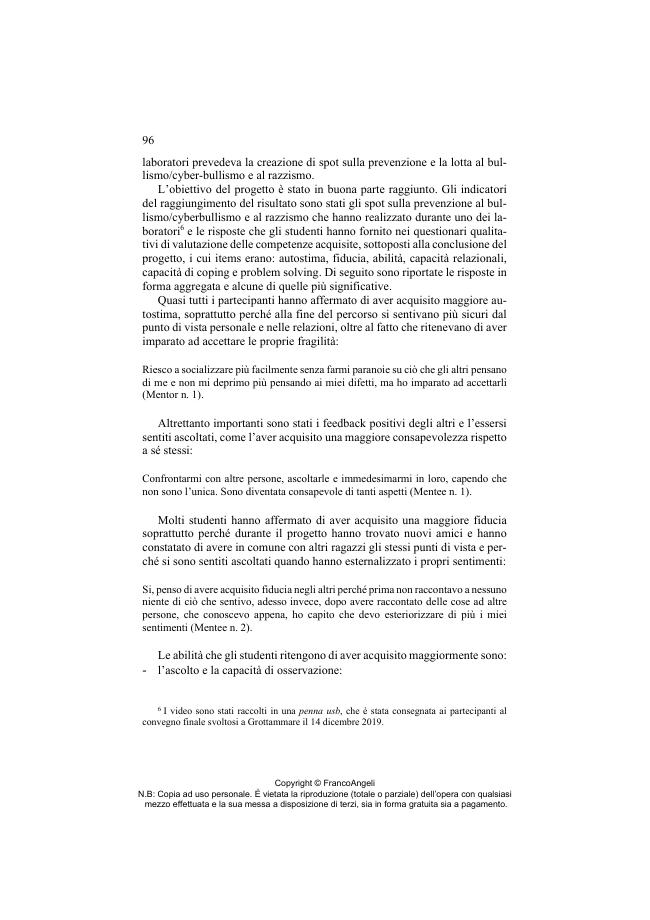BeFriend : un'occasione per scoprire il valore della relazione e del contatto con l'altro
91-100 p.
L'esperienza pratica proposta riporta i principali risultati del progetto BeFriend, svolto in due scuole medie di secondo grado della provincia di Ascoli Piceno negli anni scolastici 2017/2018 e 2018/2019. BeFriend ha affrontato il problema della povertà educativa da un punto di vista relazionale e socio-affettivo utilizzando lo strumento del peer mentoring, inteso come modello psicopedagogico e best practice che pone al centro la relazione di sostegno che si instaura tra un giovane, che vive situazioni problematiche durante il suo percorso di cre-scita, il mentee, e un giovane, il mentor, che ha lo scopo di aiutare il mentee a individuare le proprie potenzialità valorizzandole in modo sano e funzionale. Il progetto è stato diviso in due step. Nel primo 120 studenti frequentanti il triennio delle due scuole sono stati formati al mentoring, attraverso gli strumenti del Gestalt counseling e della sociologia delle migrazioni.
Nel secondo step i 120 studenti formati, divenuti mentor hanno lavorato con 120 studenti del biennio, i mentee (scelti in base a difficoltà emotive e a rischio di drop-out), sotto la supervisione e con la sollecitazione di educatori e formatori all'interno di attività laboratoriali volte sia ad affrontare e a discutere in gruppo e a coppie le fragilità e le difficoltà relazionali vissute dai mentee, sia per acquisire gli strumenti per un uso consapevole, critico e creativo dei media, sia per affrontare le questioni inerenti i pregiudizi, e le principali motivazioni delle migrazioni.
L'obiettivo del progetto è stato raggiunto, come dimostrato sia dagli spot sulla lotta e la pre-venzione al bullismo/cyberbullismo e al razzismo, realizzati durante uno dei laboratori sia dalle risposte fornite nei questionari sottoposti agli studenti alla conclusione del progetto, i cui aspetti più rilevanti sono stati: il superamento della fase infantile dell'egocentrismo, un aumento della fiducia negli altri e dell'autostima, una maggiore tendenza all'ascolto e all'empatia e la disponibilità a mettersi in gioco e a rischiare nella relazione con l'altro sco-nosciuto. [Testo dell'editore].
The proposed practical experience reports the main results of the BeFriend project, carried out in two secondary schools in the province of Ascoli Piceno in the 2017/2018 and 2018/2019 school years. BeFriend has addressed the problem of educational poverty from a relational and socio-emotional point of view using the tool of peer mentoring. This is a psycho-pedagogical model and best practice that focuses on the support relationship that is es-tablished between two young. The first one is the mentee, who experiences problematic situa-tions during his growth path, the second one is the mentor, who has the aim of helping the mentee to identify his/her potential by enhancing them in a healthy and functional way. The project was divided into two steps. In the first 120 students, that are 16 and 17 old, were trained in mentoring, through the tools of Gestalt counseling and sociology of migration.
In the second step, the 120 students trained, who became mentors, worked with 120 students younger, the mentees (chosen on the basis of emotional difficulties and risk of drop-out), un-der the supervision of educators and trainers within laboratory activities aimed at addressing and discussing in a group and in pairs the fragility and relationship difficulties experienced by the mentees. So they acquired the tools for a conscious, critical and creative use of the social media, rìthe knoweldges about the main causes of migration and how to face and mange prejudice issues. The aim of the project was achieved, as shown both by the commercials on the fight and prevention of bullying/cyberbullying and racism, carried out during one of the workshops and by the answers provided in the questionnaires submitted to students at the conclusion of the project.
The most important aspects of which significant emerged were: the overcoming of the infantile phase of egocentrism, an increase of other's trust and of the self-esteem, a greater tendency to listen and to be in empathy, the willingness to get involved and to risk in the relationship with the other unknown. [Publisher's text].
Fa parte di
Welfare e ergonomia : VI, 1, 2020-
Articoli dello stesso fascicolo (disponibili singolarmente)
-
Informazioni
Codice DOI: 10.3280/WE2020-001009
ISSN: 2531-9817
MATERIE
PAROLE CHIAVE
- Mentoring, counseling, bullismo / cyberbullismo, discriminazioni, autostima, relazione
- Mentoring, counseling, bullying / cyberbullying, discrimination, self-esteem, rela-tionship



